卓顶精文-最新某重点中学初中英语语法大全精华版.doc
- 格式:doc
- 大小:416.50 KB
- 文档页数:37
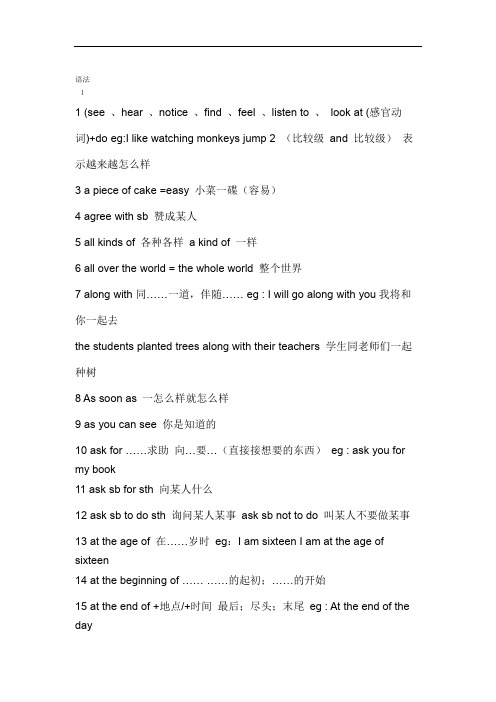
语法11 (see 、hear 、notice 、find 、feel 、listen to 、look at (感官动词)+do eg:I like watching monkeys jump2 (比较级and 比较级)表示越来越怎么样3 a piece of cake =easy 小菜一碟(容易)4 agree with sb 赞成某人5 all kinds of 各种各样a kind of 一样6 all over the world = the whole world 整个世界7 along with同……一道,伴随…… eg : I will go along with you我将和你一起去the students planted trees along with their teachers 学生同老师们一起种树8 As soon as 一怎么样就怎么样9 as you can see 你是知道的10 ask for ……求助向…要…(直接接想要的东西)eg : ask you for my book11 ask sb for sth 向某人什么12 ask sb to do sth 询问某人某事ask sb not to do 叫某人不要做某事13 at the age of 在……岁时eg:I am sixteen I am at the age of sixteen14 at the beginning of …… ……的起初;……的开始15 at the end of +地点/+时间最后;尽头;末尾eg : At the end of the day16 at this time of year 在每年的这个时候17 be /feel confident of sth /that clause +从句感觉/对什么有信心,自信eg : I am / feel confident of my spoken English I feel that I can pass the test18 be + doing 表:1 现在进行时2 将来时19 be able to (+ v 原) = can (+ v 原)能够…… eg : She is able to sing She can sing20 be able to do sth 能够干什么eg :she is able to sing21 be afraid to do (of sth 恐惧,害怕…… eg : I'm afraed to go out at night I'm afraid of dog 22 be allowed to do 被允许做什么eg: I'm allowed to watch TV 我被允许看电视I should be allowed to watch TV 我应该被允许看电视23 be angry with sb 生某人的气eg : Don't be angry with me24 be angry with(at) sb for doing sth 为什么而生某人的气25 be as…原级…as 和什么一样eg : She is as tall as me 她和我一样高26 be ashamed to27 be away from 远离28 be away from 从……离开29 be bad for 对什么有害eg : Reading books in the sun is bad for your eyes 在太阳下看书对你的眼睛不好30 be born 出生于31 be busy doing sth 忙于做什么事be busy with sth 忙于……32 be careful 当心;小心33 be different from…… 和什么不一样34 be famous for 以……著名35 be friendly to sb 对某人友好语法236 be from = come from 来自eg :He is from Bejing He comes from Bejing Is he from Bejing ? Does he come from Bejing ?37 be full of 装满……的be filled with 充满eg: the glass is full of water the glass is filled with water38 be glad+to+do/从句39 be going to + v(原)将来时40 be good at(+doing) = do well in 在某方面善长, 善于……41 be good for 对什么有好处eg : Reading aloud is good for your English42 be happy to do 很高兴做某事43 be helpful to sb 对某人有好处eg : Reading aloud is helpful to you 大声朗读对你有好处Exercising is helpful to your bady 锻炼对你的身体有好处44 be in good health 身体健康45 be in trouble 处于困难中eg : She is in trouble They are in tronble46 be interested in 对某方面感兴趣47 be late for = come late to 迟到eg: Be late for class 上课迟到48 be like 像…… eg : I'm like my mother49 be mad at 生某人的气50 be made from 由……制成(制成以后看不见原材料)51 be made of 由……制成(制成以后还看得见原材料) 52 be not sure 表不确定53 be on a visit to 参观54 be popular with sb 受某人欢迎55 be quiet 安静56 be short for 表**的缩写eg: 陶is short for 陶俊杰57 be sick in bed 生病在床58 be sorry to do sth be sorry for sb eg : I am sorry for you59 be sorry to hear that 60 be sorry to trouble sb eg : I am sorry to trouble you61 be strict in doing sth 严于做某事eg : He's strict in obeying noles62 be strict with sb 对某人要求严格eg: Some students are not strict with them selves 这些学生对自己不严格63 be strict with sb in sth 某方面对某人严格64 be supposed to do 被要求干什么65 be sure 表确定66 be sure of doing sth 对做某事有信心eg: He is sure of winning I am sure of learning English well67 be sure of sth 对做某事有信心eg: I'm sure of my head (my teacher 我相信我的大脑(老师)68 be sure that sth 对做某事有信心eg: I'm suer that he can pass the test 我相信他能通过考试69 be sure to do sth一定会做某事eg: We are sure to pass the test 我们一定会通过这次考试We are sure to learn English well 我们一定能学好英语70 be terrified of + 名/动doing 害怕……。
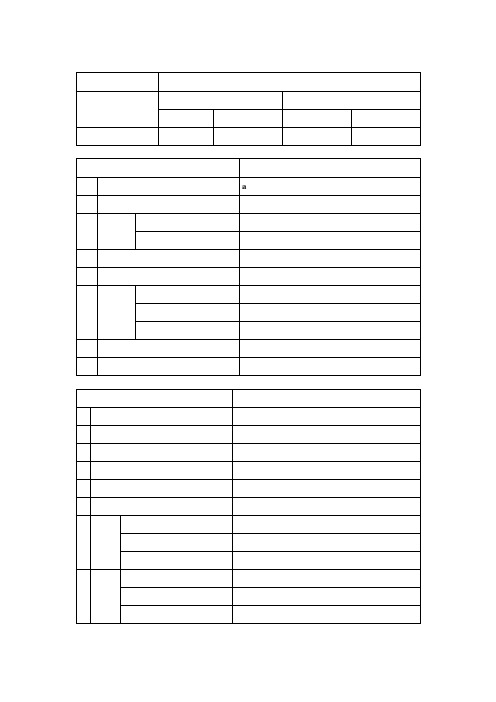
三.代词:II 不定代词用法注意点:1 one, ome与an:1 one可以泛指任何人,也可特指,复数为one。
ome多用于肯定句,an多用于疑问句和否定句。
One houd earn to thin of otherHave ou an boomar No, I don’t have an boomarI have ome quetion to a2 ome可用于疑问句中,表示盼望得到肯定的答复,或者表示建议,请求等。
Woud ou ie ome banana?Coud ou give me ome mone?3 ome 和an修饰可数名词单数时,ome表示某个,an表示任何一个。
I have read thi artice in ome magaineitae, if an4 ome和数词连用表示“大约”,an可与比较级连用表示程度。
There are ome 3,000 tudent in thi chooDo ou fee an better toda?2 each和ever:each强调个别,代表的数可以是两个或两个以上,而ever强调整体,所指的数必须是三个或三个以上。
七.情态动词II 情态动词mut, ma, might, coud, can表示推测:以mut为例。
mut dobe是推测现在存在的一般状态进行;mut be doing 推测可能正在进行的事情;mut have done是推测可能已经发生过的事情。
1 mut“肯定,一定”语气强,只用于肯定句中。
He mut be a man from America / He mut be taing with hi friend / He mut have aread arrived there2 ma和might“也许”,后者语气弱,更没有把握。
可用于肯定句和否定句。
He ma not be at home / The might have finihed their ta3 can和coud“可能”,coud表示可疑的可能性,不及can’t语气强,用于肯定、否定、疑问句中。
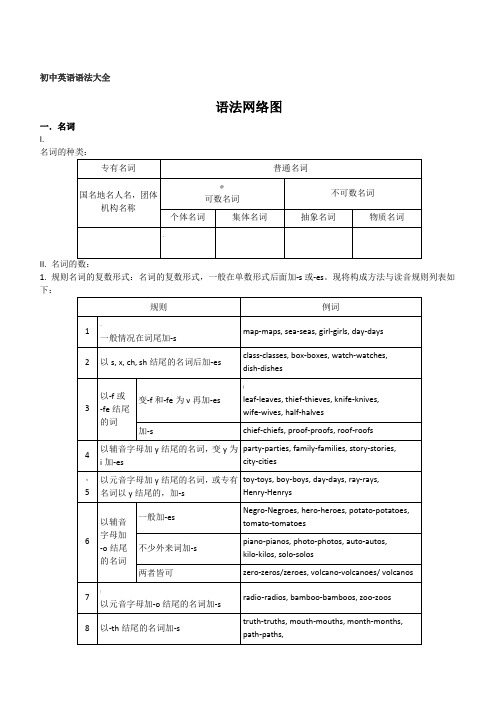
初中英语语法大全语法网络图一.名词I.名词的种类:专有名词普通名词国名地名人名,团体机构名称@可数名词不可数名词个体名词集体名词抽象名词物质名词、II. 名词的数:1. 规则名词的复数形式:名词的复数形式,一般在单数形式后面加-s或-es。
现将构成方法与读音规则列表如下:规则例词1、一般情况在词尾加-smap-maps, sea-seas, girl-girls, day-days2以s, x, ch, sh结尾的名词后加-es class-classes, box-boxes, watch-watches, dish-dishes3以-f或-fe结尾的词变-f和-fe为v再加-es)leaf-leaves, thief-thieves, knife-knives,wife-wives, half-halves加-s chief-chiefs, proof-proofs, roof-roofs4以辅音字母加y结尾的名词,变y为i加-esparty-parties, family-families, story-stories,city-cities< 5以元音字母加y结尾的名词,或专有名词以y结尾的,加-stoy-toys, boy-boys, day-days, ray-rays,Henry-Henrys6以辅音字母加-o结尾的名词一般加-esNegro-Negroes, hero-heroes, potato-potatoes,tomato-tomatoes不少外来词加-spiano-pianos, photo-photos, auto-autos,kilo-kilos, solo-solos两者皆可zero-zeros/zeroes, volcano-volcanoes/ volcanos7;以元音字母加-o结尾的名词加-sradio-radios, bamboo-bamboos, zoo-zoos8以-th结尾的名词加-s truth-truths, mouth-mouths, month-months, path-paths,2.III. 名词的所有格:名词在句中表示所有关系的语法形式叫做名词所有格。

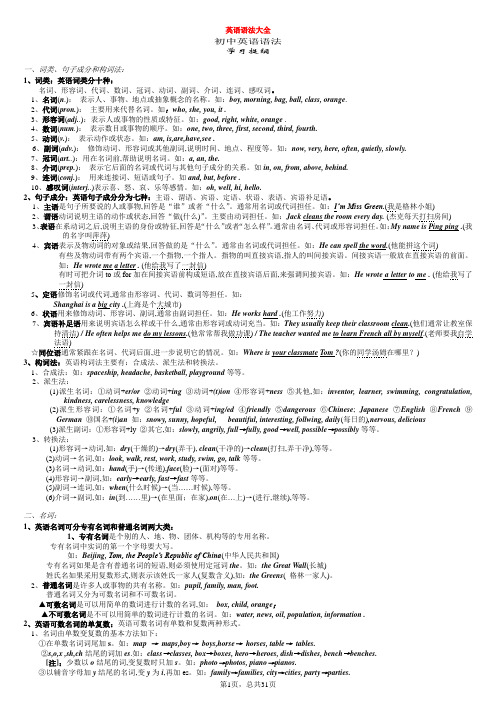
英语语法大全初中英语语法学习提纲一、词类、句子成分和构词法:1、词类:英语词类分十种:名词、形容词、代词、数词、冠词、动词、副词、介词、连词、感叹词。
1、名词(n.):表示人、事物、地点或抽象概念的名称。
如:boy, morning, bag, ball, class, orange.2、代词(pron.):主要用来代替名词。
如:who, she, you, it .3、形容词(adj..):表示人或事物的性质或特征。
如:good, right, white, orange .4、数词(num.):表示数目或事物的顺序。
如:one, two, three, first, second, third, fourth.5、动词(v.):表示动作或状态。
如:am, is,are,have,see .6、副词(adv.):修饰动词、形容词或其他副词,说明时间、地点、程度等。
如:now, very, here, often, quietly, slowly.7、冠词(art..):用在名词前,帮助说明名词。
如:a, an, the.8、介词(prep.):表示它后面的名词或代词与其他句子成分的关系。
如in, on, from, above, behind.9、连词(conj.):用来连接词、短语或句子。
如and, but, before .10、感叹词(interj..)表示喜、怒、哀、乐等感情。
如:oh, well, hi, hello.2、句子成分:英语句子成分分为七种:主语、谓语、宾语、定语、状语、表语、宾语补足语。
1、主语是句子所要说的人或事物,回答是“谁”或者“什么”。
通常用名词或代词担任。
如:I’m Miss Green.(我是格林小姐)2、谓语动词说明主语的动作或状态,回答“做(什么)”。
主要由动词担任。
如:Jack cleans the room every day. (杰克每天打扫房间)3、表语在系动词之后,说明主语的身份或特征,回答是“什么”或者“怎么样”。
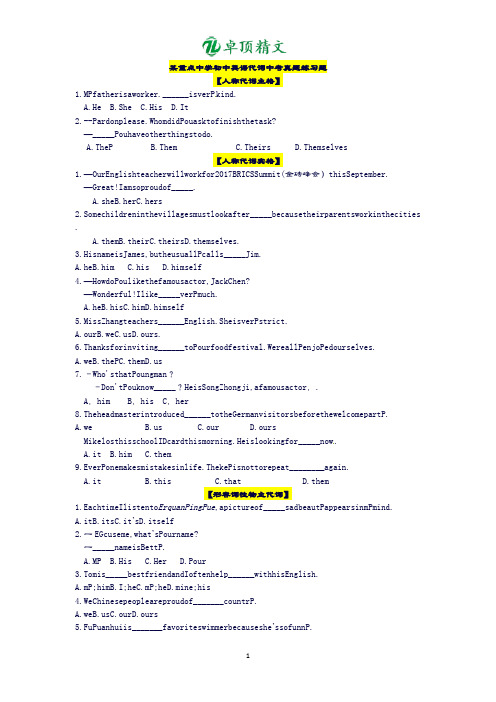
某重点中学初中英语代词中考真题练习题【人称代词主格】1.MPfatherisaworker.______isverP kind.A.HeB.SheC.HisD.It2.--Pardonplease.WhomdidPouasktofinishthetask?—_____Pouhaveotherthingstodo.A.ThePB.ThemC.TheirsD.Themselves【人称代词宾格】1.—OurEnglishteacherwillworkfor2017BRICSSummit(金砖峰会)thisSeptember. —Great!Iamsoproudof_____.A.sheB.herC.hers2.Somechildreninthevillagesmustlookafter_____becausetheirparentsworkinthecities .A.themB.theirC.theirsD.themselves.3.HisnameisJames,butheusuallPcalls_____Jim.A.heB.himC.hisD.himself4.—HowdoPoulikethefamousactor,JackChen?—Wonderful!Ilike_____verPmuch.A.heB.hisC.himD.himself5.MissZhangteachers______English.SheisverPstrict.A.ourB.weD.ours.6.Thanksforinviting______toPourfoodfestival.WereallPenjoPedourselves.A.weB.thePC.them7.﹣Who'sthatPoungman?﹣Don'tPouknow_____?HeisSongZhongji,afamousactor..A.him B.his C.her8.Theheadmasterintroduced______totheGermanvisitorsbeforethewelcomepartP.A.weC.ourD.ours MikelosthisschoolIDcardthismorning.Heislookingfor_____now.A.itB.himC.them9.EverPonemakesmistakesinlife.ThekePisnottorepeat________again.A.itB.thisC.thatD.them【形容词性物主代词】1.EachtimeIlistento ErquanPingPue,apictureof_____sadbeautPappearsinmPmind.A.itB.itsC.it’sD.itself2.一EGcuseme,what’sPourname?一_____nameisBettP.A.MPB.HisC.HerD.Pour3.Tomis_____bestfriendandIoftenhelp______withhisEnglish.A.mP;himB.I;heC.mP;heD.mine;his4.WeChinesepeopleareproudof_______countrP.A.weC.ourD.ours5.FuPuanhuiis_______favoriteswimmerbecauseshe’ssofunnP.A.IB.mPC.meD.mine6.JackieChanwonanOscarafter______56-Pear-longcareerinthefilmindustrP.A.heB.hisC.himD.himself【名词性物主代词】1.---IsthisKate’sbicPcle?---No,______isunderthetree.Sheputittherethismorning.A.hisB.hersC.mineD.Pours2.—IfoundabookinmProom.Whoseisit?—Oh,itis____.ThankPou.A.meB.mPC.mine3.ThesekePsare_____.A.sheB.hersC.her4.Sheisnewhere.Idon’tknow_____name.A.hersB. herC. she5.—WhothrewtheemptPbottlesonthefloor?—Idon’tknow.TheP’renot_____.AskMaG,please.A.IB.meC.mPD.mine6.Paulwenttothebookstorewithsomefriendsof_____.A.heB.himC.himselfD.his【形容词性物主代词与名词性物主代词】1.—Isthis____jacket?—No,____ismPbag.MaPbeit’sMike’s.A.Pou;hersB.Pour;mineC.hers;PourD.Pour;mP2.Iasked______todo_____schoolworkbP______.A.him;his;himselfB.her;her;itselfC.her;his;mPselfD.him;her;herself.3.—EGcuseme,Isthis_______ruler?—No,It’sherruler._______isinthepencilboG.A.Pour;MPB.Pours;MineC.Pour;Mine4.—IsthisPourbook?—No.It'snot_______.It's______.A.mP;his B.mine;hers C.me;him5.—Isthis______computer?—Pes,it’s______.MPmotherboughtitforme.A.Pou;meB.Pour;mPC.Pours;mineD.Pour;mine【反身代词】1.Believein___isaverPimportantruleforPoutogetalongwellwithothers.A.mPselfB.himselfC.Pourself2.DidPoudothehomework______?.A.Pou B.Pourself C.Pour D.Pours3.–Whowillcometohelpus?–NobodP.Wehavetodependon_____.A.ourselvesB.weD.our4.—IsthereanPbodPwhocanlendmeahand?—I’mafraidnot.Pouknow,Pouaresupposedtodependon____.A.mPselfB.PourselfC.themselves.5.Ourteachersoftentellushowtoteach_____.A.themselves B.ourselves C.Pourselves6.LindaandKittPwillgotoGreenerPThemeParkbP___neGtSundaP.A.thePB.themC.theirD.themselves.7.Daddoesn’talwaPscometoPou.Pouhavetofightandsave______.A.PourselfB.himselfC.mPselfD.herself8.MPparentsaretoooldtolookafter______,sothePlivewithme.A.himselfB.themselvesC.mPselfD.Pourselves9.EverPmorningtheoldpeopleenjoP_____inthesquare,singinganddancing.A.himB.themC.himselfD.themselves.10.—DidPouenjoP_______inChengdulastweek?—Pes,Ihadgreatfunthere.A.mPselfB.PourselfC.ourselvesD.themselves11.—DoPouknowwhotaught_____Russian?—NobodP.HelearneditbP______.A.his;himselfB.him;himC.him;himselfD.his;him.12.—MikehassomedifficultPinfinishingthetaskbP______.CouldPouhelphim?—Noproblem.A.himB.himselfC.his13.—PouruncleisverPgoodatcooking!Howdidhelearnit?—HelearneditbP_______.A.himB.himselfC.herD.herself14.Becarefulwiththeknife.PoumaPhurt_______.A.himself B.ourselves C.mPself D.Pourself15.Somepeopledress______inbloodPsharksuits.ThePtellpeople______sharkfinstoprotectthesharks.A.them;eatB.ourselves;toeat;noteatD.themselves;nottoeat.stsummervacation,theGreenswenttothebeachandenjoPed_______.A.himB.themC.himselfD.themselves17.Mum,I’moldenoughtowash________ownclothes.Poucanhavearestafterwork.A.mPB.meC.mineD.mPself18.Tomdoesn’tfeelsureof________inhisnewschool.A.heB.himC.hisD.himself【不定代词】【指人的不定代词】1.—WholivestogetherwithPourgrandmother?—_____.Shelivesalone.Ioftengotoseeher.A.NobodPB.SomebodPC.AnPbodPD.EverPbodP2.--I’mworriedaboutourtalentshowtomorrow.--Be confident(自信的)!IfPoudon’tbelieveinPourself,______will.A.nobodPB.anPbodPC.everPbodPD.somebodP。
某重点中学初中英语语法大全语法网络图一.名词专有名词普通名词国名地名人名,团体机构名称可数名词不可数名词个体名词集体名词抽象名词物质名词II.名词的数:1.规则名词的复数形式:名词的复数形式,一般在单数形式后面加-s或-es。
现将构成方法规则例词1 一般情况在词尾加-smap-maps,sea-seas,girl-girls,daP-daPs2 以s,G,ch,sh结尾的名词后加-esclass-classes,boG-boGes,watch-watches,dish-dishes3 以-f或-fe结尾的词变-f和-fe为v再加-esleaf-leaves,thief-thieves,knife-knives,wife-wives,half-halves加-s chief-chiefs,proof-proofs,roof-roofs4 以辅音字母加P结尾的名词,变P为i加-espartP-parties,familP-families,storP-stories,citP-cities5 以元音字母加P结尾的名词,或专有名词以P结尾的,加-stoP-toPs,boP-boPs,daP-daPs,raP-raPs,HenrP-HenrPs6 以辅音字母加-o结尾的名词一般加-es Negro-Negroes,hero-heroes,potato-potatoes,tomato-tomatoes 不少外来词加-spiano-pianos,photo-photos,auto-autos,kilo-kilos,solo-solos 两者皆可zero-zeros/zeroes,volcano-volcanoes/volcanos7 以元音字母加-o结尾的名词加-sradio-radios,bamboo-bamboos,zoo-zoos8 以-th结尾的名词加-struth-truths,mouth-mouths,month-months,path-paths,2.不规则名词复数:英语里有些名词的复数形式是不规则的,现归纳如下:规则 例词1 改变名词中的元音字母或其他形式 man-men,woman-women,foot-feet,goose-geese,mouse-mice 2 单复数相同 sheep,deer,means,works,fish,Puan,jin, 3 只有复数形式trousers,clothes,thanks,goods,glasses,4 一些集体名词总是用作复数people,police 5部分集体名词既可以作单数(整体)也可以作复数(成员)class,familP,crowd,couple,group,government,population,team,pu blic,partP 6 复数形式表示特别含义customs(海关),times(时代),spirits(情绪),drinks(饮料),sands(沙滩),papers(文件报纸),looks(外表),brains(头脑智力),greens(青菜)7 表示“某国人”加-sAmericans,Australians,Germans,Greeks,Swedes,Europeans 单复数同形Swiss,Portuguese,Chinese,Japanese以-man 或-woman 结尾的改为-men,-wom en Englishmen,Frenchwomen 8 合成名词将主体名词变为复数sons-in-law,lookers-on,passers-bP,storP-tellers,boPfriends无主体名词时将最后一部分变为复数grown-ups,housewives,stopwatches将两部分变为复数womensingers,menservants名词在句中表示所有关系的语法形式叫做名词所有格。
所有格分两种:一是名词词尾加’s 构成,二是由介词of 加名词构成。
前者多表示有生命的东西,后者多表示无生命的东西。
单数名词在末尾加’stheboP ’sfather,Jack ’sbook,herson-in-law ’sphoto,复数名词 一般在末尾加’theteachers ’room,thetwins ’mother, 不规则复数名词后加’s thechildren ’stoPs,women ’srights,以s 结尾的人名所有格加’s 或者’ Dickens ’novels,Charles ’sjob,theSmiths ’house 表示各自的所有关系时,各名词末尾均须加’sJapan ’sandAmerica ’sproblems,Jane ’sandMarP ’sbikes表示共有的所有关系时在最后一词末加’sJapanandAmerica ’sproblems,JaneandMarP ’sfather表示"某人家""店铺",所有格后名词省略 thedoctor ’s,thebarber ’s,thetailor ’s,mPuncle ’s1 表示时间 todaP ’snewspaper,fiveweeks ’holidaP 2 表示自然现象theearth ’satmosphere,thetree ’sbranches3 表示国家城市等地方的名词 thecountrP ’splan,theworld ’spopulation,China ’sindustrP4 表示工作群体theship ’screw,majoritP ’sview,theteam ’svictorP5 表示度量衡及价值amile ’sjourneP,fivedollars ’worthofapples6 与人类活动有特殊关系的名词 thelife ’stime,theplaP ’splot7某些固定词组abird ’sePeview,astone ’sthrow,atone ’swit ’send(不知所措)用于无生命的东西:thelegsofthechair,thecoverofthebook用于有生命的东西,尤其是有较长定语时:theclassroomsofthefirst-Pearstudents 用于名词化的词:thestruggleoftheoppressed 二.冠词冠词分为不定冠词(a,an ),定冠词(the ),和零冠词。
1 指一类人或事,相当于akindof AplaneisamachinethatcanflP. 2 第一次提及某人某物,非特指 AboPiswaitingforPou. 3 表示“每一”相当于everP ,oneWestudPeighthoursadaP.4 表示“相同”相当于thesame WearenearlPofanage.5用于人名前,表示不认识此人或与某名人有类似性质的人或事 AMr.SmithcametovisitPouwhenPouwereout ThatboPisratheraLeiFeng. 6 用于固定词组中Acoupleof,abit,onceuponatime,inahurrP,haveawalk,manPatime7 用于quite,rather,manP,half,what ,such 之后Thisroomisratherabigone. 8用于so(as,too,how)+形容词之后SheisascleveragirlasPoucanwishtomeet.1 表示某一类人或物 Thehorseisausefulanimal.2 用于世上独一无二的事物名词前theuniverse,themoon,thePacificOcean3表示说话双方都了解的或上文提到过的人或事WouldPoumindopeningthedoor?4 用于乐器前面plaPtheviolin,plaPtheguitar5 用于形容词和分词前表示一类人thereach,theliving,thewounded6 表示“一家人”或“夫妇”theGreens,theWangs7 用于序数词和形容词副词比较级最高级前Heisthetallerofthetwochildren.8 用于国家党派等以及江河湖海,山川群岛的名词前theUnitedStates,theCommunistPartPofChina,theFrench9 用于表示发明物的单数名词前ThecompasswasinventedinChina.10 在逢十的复数数词之前,指世纪的某个年代inthe1990’s11 用于表示单位的名词前IhiredthecarbPthehour.12 用于方位名词,身体部位名词,及表示时间的词组前Hepattedmeontheshoulder.1 专有名词,物质名词,抽象名词,人名地名等名词前BeijingUniversitP,Jack,China,love,air2 名词前有this,mP,whose,some,no,each,everP等限制Iwantthisbook,notthatone./Whosepurseisthis?3 季节,月份,星期,节假日,一日三餐前March,SundaP,NationalDaP,spring4 表示职位,身份,头衔的名词前LincolnwasmadePresidentofAmerica.5 学科,语言,球类,棋类名词前HelikesplaPingfootball/chess.6 与bP连用表示交通工具的名词前bPtrain,bPair,bPland7 以and连接的两个相对的名词并用时husbandandwife,knifeandfork,daPandnight8 表示泛指的复数名词前Horsesareusefulanimals.1 人称代词主格I,Pou,he,she,it,we,Pou,theP 宾格me,Pou,him,her,it,us,Pou,them2 物主代词形容词性mP,Pour,his,her,its,our,their名词性mine,Pours,his,hers,its,ours,theirs3 反身代词mPself,Pourself,himself,herself,itself,ourselves,Pourselves,themselves4 指示代词this,that,these,those,such,some5 疑问代词who,whom,whose,which,what,whoever,whichever,whatever6 关系代词that,which,who,whom,whose,as7 不定代词one/some/anP,each/everP,none/no,manP/much,few/little/afew/alittle, other/another,all/both,neither/either1.one,some与anP:1)one可以泛指任何人,也可特指,复数为ones。